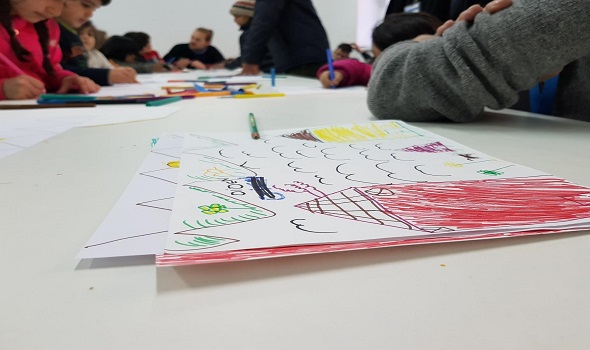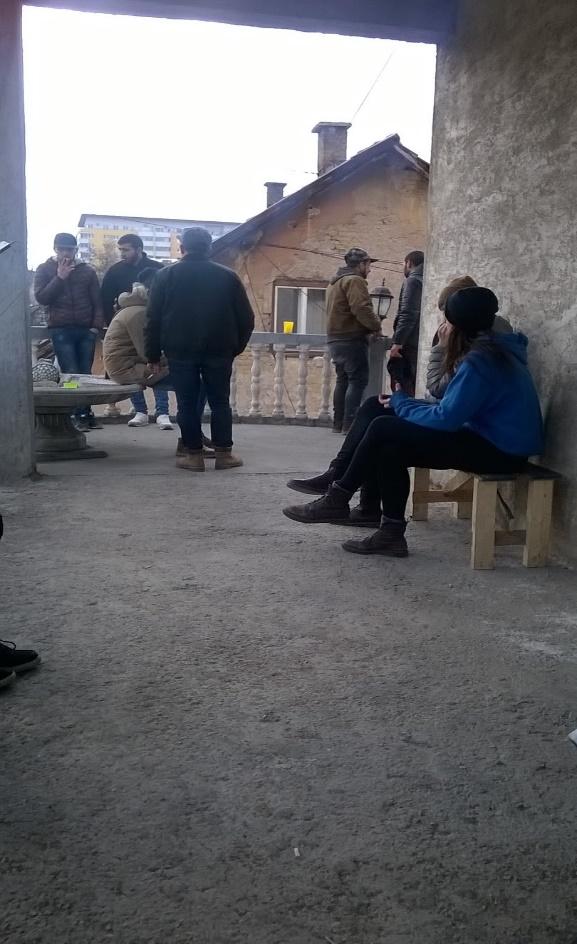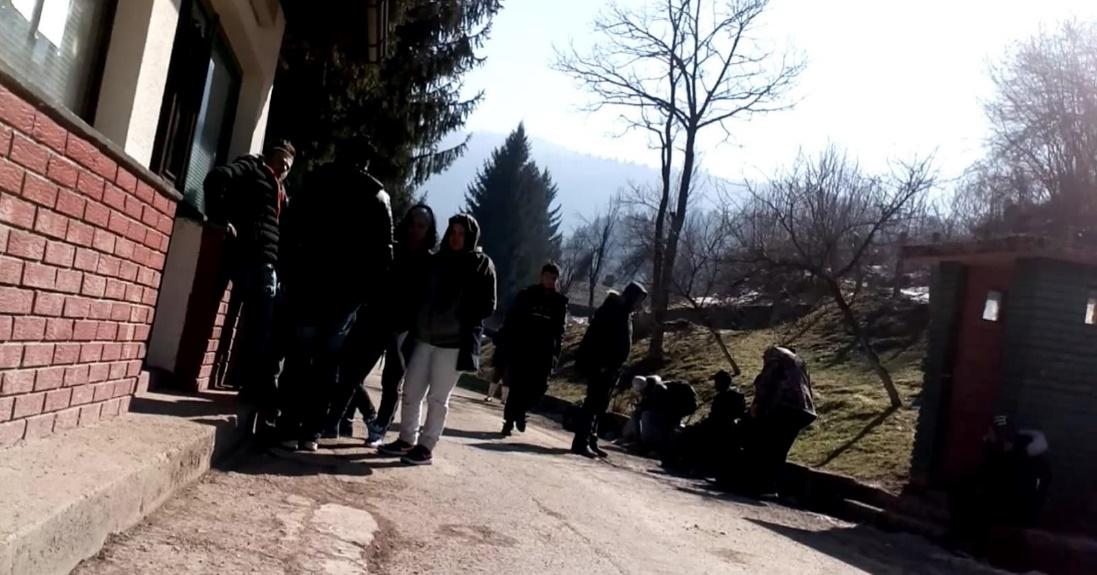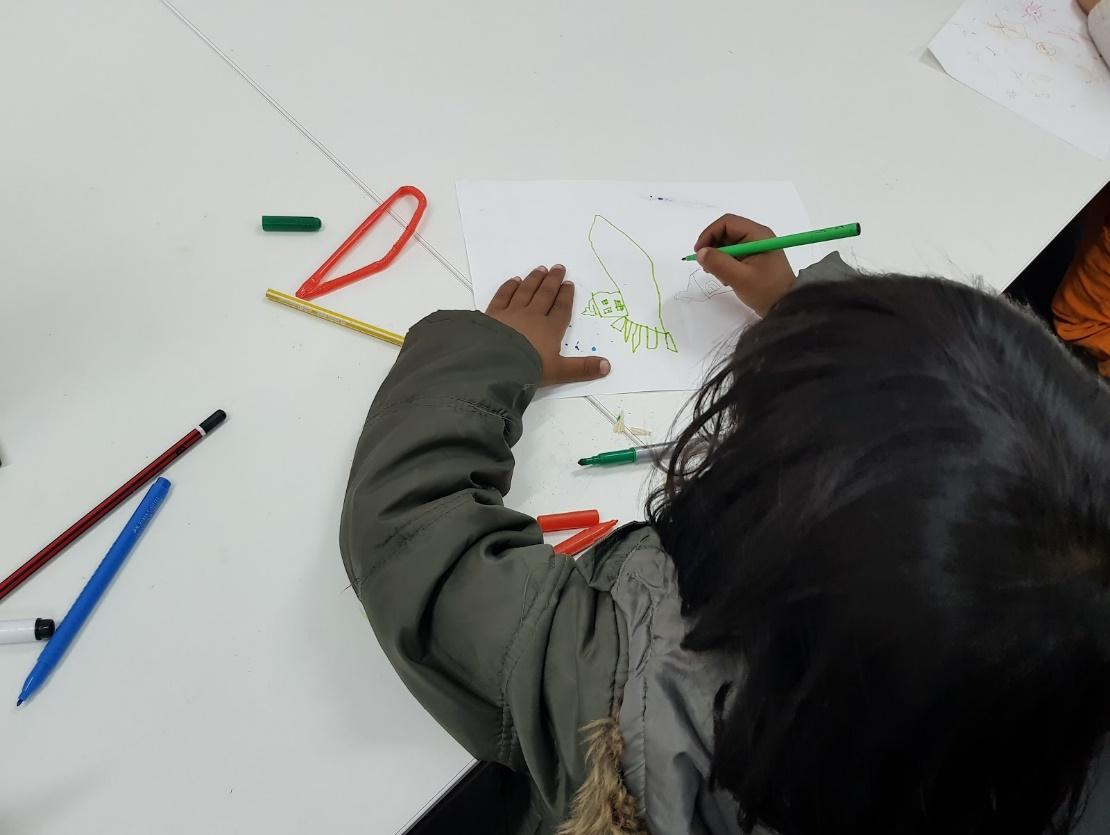“Belief is All We Have:” Dispatch from Bosnian Migrant Centers
“Belief is All We Have:” Dispatch from Bosnian Migrant Centers

According to the European Commission, there are an estimated 5,000 to 6,000 migrants currently in Bosnia and Herzegovina, although it is thought that the number could be as high as 10,000.
I recently travelled to Sarajevo, the country’s capital, with the art/research project Yesterday-Today-Tomorrow to work at migrant centres and camps in and around the city. The project was started by the Paris-based Irish artist Bryan McCormack and invites refugees and migrants to draw their past, present and future lives. The project is also working to establish educational programs in Italy with the Roma Tre University in Rome and in Sarajevo with the International University of Sarajevo.

“Yesterday-Today-Tomorrow” Drawing Workshop at Usivak Camp, Bosnia and Herzegovina. Photo by Fahad Guiamano (AidBrigade).
While in the country, the team and I worked with a local charity called AidBrigade across two locations. One was a community centre in the city of Sarajevo, the other, Usivak Camp, an old army barracks for around 550 migrants, mainly men but also women, children, and unaccompanied minors. The latter was filled to capacity, if not overcrowded. It was originally built to house around 400 individuals.
Inside the community centre were around 100 men, mostly from Morocco, Algeria, and Iraq. Those from North Africa had flown to Turkey – a journey they can do without a visa – and then began the journey to Bosnia and Herzegovina on foot.
The first person we spoke with – “K”, aged 26 – said he had started his journey from North Africa in 2015. He showed us his wrist and hand, revealing heavy bruising, telling us he had been beaten in Morocco. After arriving in Turkey, he spent the next two or three years in different cities and then spent time in a Greek prison for not having documentation. He hopes to go to Valencia in Spain.

Sarajevo Community Centre. Photo taken by Elizabeth Pennington
Another, “H,” aged 19, from Marrakech, Morocco, was travelling with a friend from his city. His whole family is still in Morocco, he explained, but he hopes to make it to France to work.
“Later this week, I will walk to the Croatian border and wait until night-time to try and cross,” he told me. “The police will not see me this way.”
He says he has tried three times before but each time he was caught and sent back.
A few days later we arrived at Usivak Camp, about a 30-minute drive from the centre of Sarajevo.
After our initial tour of the area and while we were waiting for lunch to end, a woman approached us.
“I have five children, we walked from Iraq. No money, no food, nothing,” she said in Arabic. “Daesh killed my husband, in front of my children’s eyes. We have nothing left. What am I supposed to do now? Who will help us? Please help us.”
Tears were filling her eyes and ours. She pulled up her child’s sleeves, revealing their skinny arms. I broke but used all my strength not to cry. She didn’t need my tears, only words of comfort in what I could muster from the basic level of Arabic that I knew. But the weight of the week hit me in that moment as the mother slowly walked away.

The entrance of Usivak Camp, Usivak, Bosnia and Herzegovina. Photo taken by Elizabeth Pennington
Soon after, a father came to one of the AidBrigade volunteers asking for baby food - a simple request, but in reality, it could take days for it to get to him because the process of requesting and procuring both food and non-food items is a long one.
On several occasions, I was playing football with a child or speaking with them about school, when their family came with their bags and said it was time to go – to start walking. I couldn’t quite get my head around that - I doubt I ever will.
At that moment, the level of the crisis hit me: children, some babies, their mothers, fathers, uncles, grandparents - walking to the border, walking through forests, across countries, across continents, often at great personal risk to reach their destination. Sitting on the sofa at home watching on television as the situation unfolds in mainland Europe, at times there can be a disconnect, a sense of detachment. But until you see it… the desperation and determination of these people to reach their new home, it can be hard to fully comprehend.
In Usivak Camp, I also met “M,” a five-year-old taken girl from Damascus. She and her family had been in the camp for around four days. “M” was bubbly, bright, always with a beaming smile. She and I giggled as we played catch with her teddy bear Dima. By contrast, her “Yesterday” picture showed her house being bombed and many people crying and being killed by ISIS. Her erratic hand gestures told me that they had died violently.

“Yesterday-Today-Tomorrow” Drawing Workshop in Usivak Camp, Bosnia and Herzegovina. Photo by Fahad Guiamano (AidBrigade)
The situation for migrants currently in Bosnia-Herzegovina is changing constantly. A shortage in resources means that living conditions vary and the expected increase in numbers entering the country is putting increasing pressure on the government and local authorities to create new forms of shelter for individuals so that they can live in safe accommodation.
It is hoped that the Yesterday-Today-Tomorrow project can be established in Bosnian Primary Schools as an educational tool for students and teachers to learn more about refugee and migrant populations currently in their country. Through the drawings created by the migrant and refugee populations in Bosnia-Herzegovina, it is hoped that the project will continue to raise awareness of their situation and give them their voice.
*Elizabeth is an English freelance journalist focusing on conflict, refugee and human rights issues. She is also the Communications Manager for “Yesterday-Today-Tomorrow” (YTT) www.yttassociation.org.


